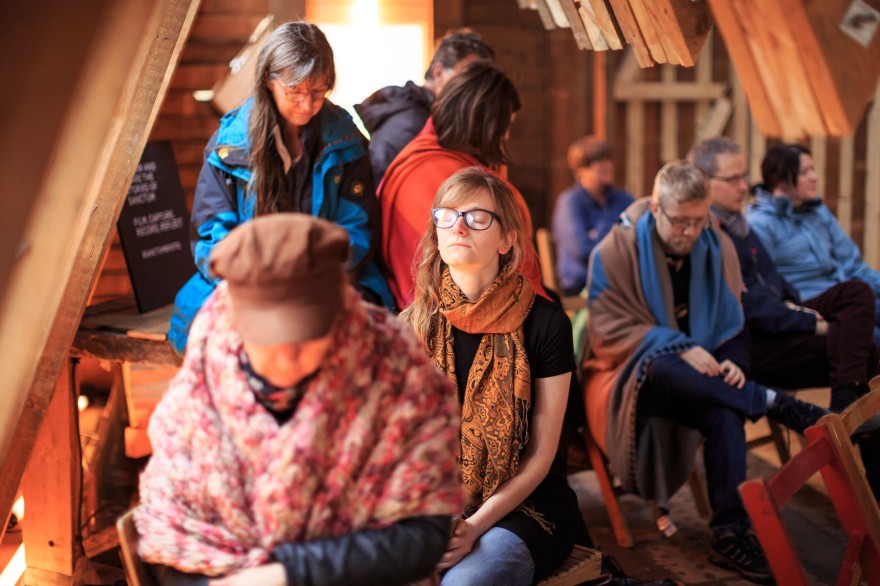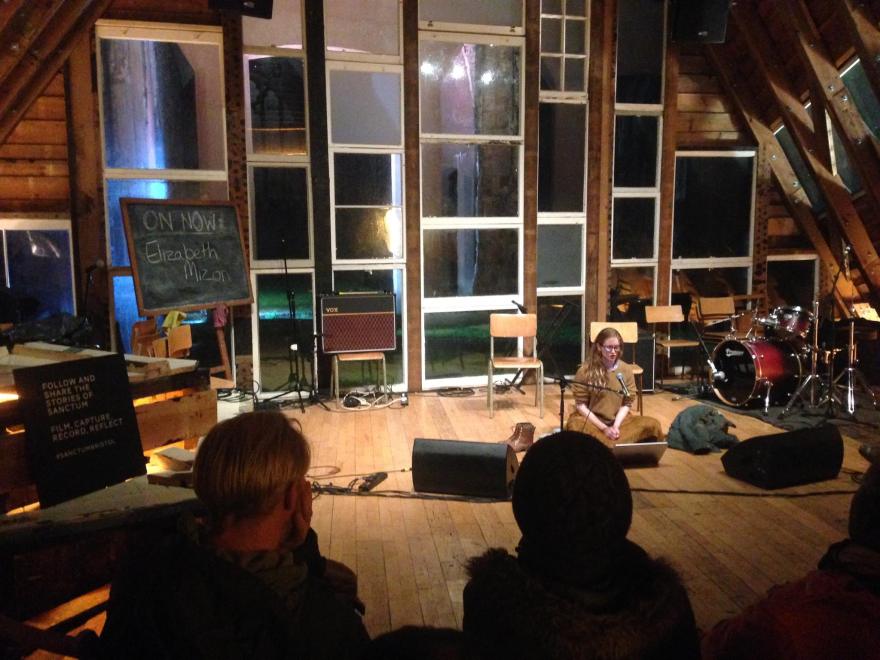 I can’t shake the feeling that the Gods somehow fumbled the design of our inner character last thing on the Saturday night, distracted by a lack of sleep, and rushing in anticipation of the awesome horizontalness to come. While life on Earth is globally, chronically, and undeniably insane, it is for the most part dull as fuck. Some people appear to deal with it better than others; perhaps you don’t at all mind daily life’s insistence on enacting the inestimable cut scenes from every film ever, from Meek’s Cutoff to A Serbian Film.
I can’t shake the feeling that the Gods somehow fumbled the design of our inner character last thing on the Saturday night, distracted by a lack of sleep, and rushing in anticipation of the awesome horizontalness to come. While life on Earth is globally, chronically, and undeniably insane, it is for the most part dull as fuck. Some people appear to deal with it better than others; perhaps you don’t at all mind daily life’s insistence on enacting the inestimable cut scenes from every film ever, from Meek’s Cutoff to A Serbian Film.
But I mind. Meek’s Cutoff was lame.
In 25 years of research in the field, I have, at times, found sharing (privatised) land, (polluted) air and (what passes for) mutual cognition with you all kinda unbearable. For years, I more-than-welcomed a number of short-term-effective coping mechanisms, but once sober enough to process what I really needed, none was so effective as dosing myself up to the eyeballs with psychotherapy. If we were all forced to have a bit of a think and a chat, creating a big ol’ space in our minds for understanding and reflection, we might not do so much political bickering and hypothesizing about other people’s life choices all over the internet based only on our own experience. We might even have a shot at that world peace thing (joke.) Human beings are naturally narcissistic – it’s not your fault. (It’s not your fault. [It’s not your fault.]) So here’s a few reasons why you should be more like me.
1. More and more of us have worsening mental health.
The effects of the global recession are being fully felt; not only financially, but emotionally. Reports of depression and stress have increased four- or five-fold, as inequality and struggle become ever more banal. Statistics from 2007 (the most recent national review) note that 10% of UK adults are diagnosed depressed, and 9% of the UK population meets the criteria for diagnosis of mixed anxiety and depression. (At this point, the global recession hadn’t even happened. Nor had the Con-Dem coalition’s class war. It would be a couple of years of average misery before these public services would be handed stoically to an already glum, highly-strung population.) Luckily, the UK’s National Health Service website informs us that while there are many different types of psychotherapy, the aim of each and every one is to “make you feel better.” While the NHS’s particular brand of PR may be condescending, it is also 100% correct. (US readers: I’d suggest you try our evil socialist healthcare system while it lasts, but we are as ironically averse to immigration as you are.)
(Statistics update from 2011)
Talking therapies are proven to be as, if not more, effective than medication at treating not only serious psychological conditions such as depression, bipolar disorder and schizophrenia, but also at vastly improving the quality of life of those who are grieving; have experienced abuse; have been made redundant; are experiencing general stress and anxiety; or are not a favoured member of their region’s kyriarchy.
If you don’t consider yourself a member of the 90% of the population described above, then either you’re a human being with few complaints, a master of your emotions who knows instinctively how to take care of yourself and others, or you are the killer/abuser/layer-offer/bully/illuminati emperor and/or member of the narcissistic corporate elite in the dynamic. In which case, GET OFF THE INTERNET AND INTO THERAPY or welcome the death of the Earth you preside over (and/or the uprising of the masses…? Anyone?)
Even though the therapeutic method most often focuses on purging the frightening, frustrating and harmful thoughts and feelings you contain, ejecting this poisonous bile at someone you have to repeatedly give money to starts to feel better and better. It’s a bit like never being able to sneeze or shit, and then learning to expel them one by one, weekly, for approximately an hour at a time, and eventually becoming a wet wipe connoisseur.
2. Most people suck at relationships (including therapists.)
In contrast to many people’s idea of the forced-yet-necessary-stoicism of the therapist, Irvin Yalom, therapist, author and Emeritus Professor of Psychiatry at Stanford, believes that it is not at all inappropriate for a therapist to acknowledge their feelings and personality within the relationship; it is, in fact, hugely beneficial to the patient:
“From comic strips to Hollywood features, the analyst is often portrayed sitting behind a desk or a notebook, literally out of reach and out of sight of the person being analysed. As patients, we perceive that person sitting across from us as a powerful and impenetrable figure, yet we’re expected to reveal ourselves up to their scrutiny.” [Source: psychotherapy.net]
One of the most fundamental difficulties human beings insist upon is creating and sustaining unhealthy relationships. This leads to eventual isolation, the breakdown of families, and at it’s most extreme and macro levels, war and exploitation. There are numerous upon numerous reasons for these dysfunctions; some benign and understandable, some horrific and relentless. The majority involve some kind of abuse, and whether this be serious child abuse or short-lived school bullying, the effects are almost always felt well into adulthood.
Yalom has written extensively, in both fiction and non-fiction formats, about the fundamental relationship dynamic of therapy. He has revolutionized for many the way in which this relationship is viewed, and how it functions for the benefit of the patient. He is “a keen advocate for unmasking the therapist. One of the main reasons that people fall into despair is that they are unable to sustain gratifying relationships. According to Yalom, therapy is their opportunity to establish a healthy give-and-take with an empathetic counselor; one who is not afraid to show his or her vulnerabilities.” As long as ‘vulnerabilities’ is interpreted literally and legally, the therapeutic relationship can be a template on which to measure how, henceforth, one might bounce merrily with ones brethren.
3. You can teach yourself numerous invaluable skills
As noted previously in the shit and sneezes metaphor, talking therapy requires, and develops, persistence. From this painful and seemingly never-ending grind comes an understanding of healthy boundaries, self-expression, reflection, and self-awareness, to name only a few essential personality traits (assuming you consider it essential to be at least bearable.) Further, occupational therapy literally gives people physical skills in order to help them gain the tools needed to participate in society effectively, especially after trauma. It is a lengthy process of progress and slow change to make those who are wounded fully healed, and for them to independently maintain that health. Plus, it would make all losers suck a lot less. (Seriously, stop staring at a screen. Jeez. [I will if you will.])
This ranges from teaching (sometimes re-teaching) people how to dress themselves, to be in public spaces without anxiety and to walk or talk again, to teaching employable skills and tools for expression which allow people to regain enjoyment and pleasure from life. I’m sure each of us could find space in our lives to fill the void that little bit more. (Screw you, void. I’m coming for you with my authoritarian mandatory therapy world domination policy, and you can’t hide from that. Especially once I’ve put it on a banner, and flown it around the sky above you, VOID!)
4. It’s utilizes and transforms your ‘worst’ traits
Therapy basically provides a framework perfect for curing yourself of being a selfish bastard, utilising the methodology of well-focused self-obsession. The key therapist-patient relationship affords you an allotted time and safe space to discuss anything and everything you need to, without judgment. For example, this would prevent people with serious or chronic grievances from over-unloading on friends who likely have as many issues of their own, and time constraints and pressure from elsewhere. Therapists are trained to indirectly provide what a client needs at a particular point and adapt with them (by helping them provide for themselves), bypassing the resentment and frustration that can arise from imbalance in intimate relationships.
If you ever needed an excuse for being “selfish”, it’s improving your own wellbeing. Therapy is completely private, like having a conversation inside your head with someone who understands your thought patterns guiding you away from repeating down destructive pathways. And therapists don’t expect you to be nice to them, or polite about your children, or reasonable about the utter incompetence of people who walk too slowly, and then look at you like that when you righteously barge past them like the glittering hero of pedestrianism that you are, to the raucous applause in your mind. Your superior mind, attached to a body with places to be.
It’s kind of weird – they don’t need anything back! Except money.*
5. It would keep costs low
Vikram Patel of the World Health Organisation says that countries such as Canada, UK and the Scandinavian countries, who have strong welfare systems (!!) and, to an extent, affordable or free mental health care, already offer the best care overall.
In the UK, there is quite a waiting list for free therapy & counselling on the NHS, but it is available to anyone who needs it. We also have a number of nationwide networks which provide free, short term (usually six sessions/weeks) counselling to combat specific problems faced, such as Rape Crisis and Mind. But psychotherapy is generally a long-term, indefinite process with one therapist, aimed at understanding patterns and themes in ones behaviour; thereby unsustainable as a free service.
Private therapy is expensive. Often those who need it most, people who are financially struggling, cannot access it. At best, you’re looking at ~£200 a month. Mandatory therapy would form the basis for it to be made either free or widely affordable, encouraging people to form depression unions and schizophrenic pressure groups. What’s the worst that could realistically happen?
6. Therapy is a microcosm for life.
Therapy prepares us for understanding and making beneficial challenges within and without the boundaries of our societies. We (in the west) live in a culture in which we are increasingly reluctant to fully communicate, or make radical changes to ourselves to facilitate the betterment of society as a whole. This can be seen at both individual and governmental levels.
Unfortunately, when we would welcome change and communication, we don’t necessarily have the time to enact it. In several ways therapy augments and fosters our ability to optimize functioning alongside one another, and maximizes our ability to derive what we need from life and what society needs from us. It is also the starting point (and a relevant allegory) for understanding the boundaries we maintain to keep us from living our lives fully.
In a paper titled Psychotherapy & Politics: Uncomfortable Bedfellows?, The Midlands Psychology Group quotes D. Pilgrim as advocating “the potential for the development of more radical forms of therapy arising from challenges to the reductionism of mainstream therapies.” He “saw psychotherapy as first promising a role in personal and political liberation.” Without being able to commit to radical changes for the better in oneself (however small), it is unlikely that we will be able to radically change anything else.
Christopher Willoughby goes one further, arguing that therapy can shirk its moral responsibility if it doesn’t acknowledge that social determinants are often the source of most patient anguish and disadvantage: “An inability to psychologically tolerate our social circumstances can lead to social alienation through behaviour society finds threatening, embarrassing or uncooperative and inefficient. […] Counselling and psychotherapy are particularly well placed to act as a platform to facilitate social solidarity given that they are faced daily with managing the consequences of social injustice and inequality.”
In the absence of free, mandatory therapy for everyone, understanding therapy as a mutual work that we can work towards together, as a reflective tool for radical change, could be a start.

*And boundaries. Also, be nice and reasonable anyway?
 (…bought with my first bit of student loan – did ’07’s Apple Inc. team miss the planned obsolescence memo or something? Or did they only officially incorporate it as policy later this decade? I remain gratefully stunned. Hang in there, my square little buddy.)
(…bought with my first bit of student loan – did ’07’s Apple Inc. team miss the planned obsolescence memo or something? Or did they only officially incorporate it as policy later this decade? I remain gratefully stunned. Hang in there, my square little buddy.)








